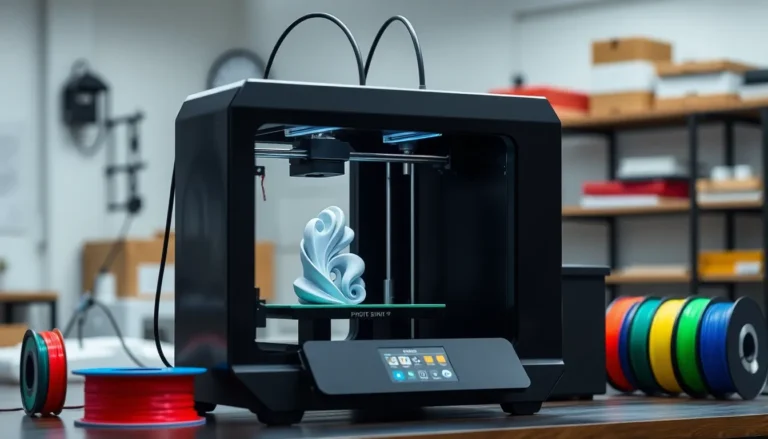Table of Contents
ToggleIn a world where your toaster might just start texting you, IoT developers are the unsung heroes making it happen. These tech wizards are crafting the future, connecting everything from smart fridges to wearable devices, and turning everyday objects into digital dynamos. If you’ve ever wondered how your coffee maker knows just when to brew that perfect cup, you can thank an IoT developer for that morning miracle.
But it’s not all just gadgets and gizmos. These developers are tackling real-world problems, improving efficiency and enhancing our lives in ways we never thought possible. With the Internet of Things expanding faster than a kid in a candy store, the demand for skilled IoT developers is skyrocketing. So, whether you’re a tech enthusiast or a business leader, understanding the role of IoT developers could be your ticket to staying ahead in this thrilling digital age.
Overview of IoT Developers
IoT developers play a vital role in shaping technology that integrates seamlessly into everyday life. They specialize in designing, developing, and maintaining applications that enable devices to communicate over the Internet. Their expertise encompasses various programming languages, protocols, and frameworks suited for IoT environments.
Many IoT developers focus on embedded systems, creating software that runs on hardware devices like sensors and microcontrollers. These developers collaborate with hardware engineers to ensure compatibility and functionality. By doing so, they facilitate the creation of innovative products such as smart thermostats and wearable health devices.
Data management is another critical area for IoT developers. They handle the massive amounts of data generated by connected devices, implementing strategies for efficient data collection, storage, and analysis. Understanding cloud computing and edge computing becomes essential for managing this data flow effectively.
Security remains a top priority for IoT developers. They implement measures to protect devices from cyber threats, including encryption protocols and secure communication channels. Knowledge of security best practices ensures that connected devices maintain user privacy and operational integrity.
Real-time processing capabilities are increasingly necessary for IoT applications. Developers prioritize building systems that can process data instantaneously, enabling immediate responses to user inputs or environmental changes. This aspect plays a significant role in applications like smart home automation and industrial IoT systems.
Continuous learning is crucial for IoT developers as technology evolves rapidly. Engaging in online courses, attending industry conferences, and participating in community forums helps them stay updated on advancements. The ability to adapt and innovate keeps them at the forefront of the IoT landscape.
Skills Required for IoT Developers

IoT developers require a diverse skill set to effectively create and manage smart devices. Mastery of key areas enhances their ability to innovate in the rapidly evolving technology landscape.
Programming Languages
Proficiency in programming languages is essential for IoT developers. Languages such as C, C++, Python, and JavaScript play a pivotal role in developing applications for connected devices. C and C++ enable efficient coding for embedded systems, while Python facilitates data management and rapid prototyping. JavaScript often supports web interfaces for IoT applications, making user interactions seamless. Developers who excel in these languages can build scalable and efficient solutions for various IoT challenges.
Networking Knowledge
Understanding networking principles is crucial for IoT developers. Familiarity with protocols like MQTT, CoAP, and HTTP ensures effective communication between devices. Furthermore, experience with IP networking supports seamless integration of IoT devices into existing systems. Knowledge of network topologies and security practices strengthens device connectivity while minimizing vulnerabilities. Strong networking skills help developers optimize performance, contributing to the overall effectiveness of smart technology solutions.
Security Awareness
Prioritizing security awareness is vital for IoT developers in safeguarding connected devices. They must recognize potential cyber threats and vulnerabilities inherent in IoT systems. Implementing encryption methods, such as TLS and SSL, protects sensitive data transmitted between devices. Developers also need to understand secure coding practices to mitigate risks during the development process. Continuous education on cybersecurity trends equips IoT developers to adapt to evolving threats, ensuring the safety of user’s data and devices.
Tools and Technologies Used by IoT Developers
IoT developers rely on a range of tools and technologies to build effective solutions. These tools simplify the development process and enhance the functionality of connected devices.
IoT Platforms
IoT platforms serve as foundational ecosystems for developing, deploying, and managing IoT applications. Notable platforms include Amazon Web Services IoT, Microsoft Azure IoT, and Google Cloud IoT. Each platform offers essential features like device management, data analytics, and machine learning. Developers can easily integrate sensors and actuators into these platforms. The flexibility of these platforms enables scalability, allowing developers to expand their IoT solutions as demand increases.
Development Frameworks
Development frameworks provide structured environments for building IoT applications quickly and efficiently. Popular frameworks include Node-RED, Arduino, and Eclipse IoT. Each framework supports various programming languages and protocols, facilitating seamless integration with hardware and software components. These frameworks enhance collaboration among developers, enabling them to share code and leverage existing libraries. Faster prototyping and testing are achievable, allowing IoT developers to innovate and deliver solutions swiftly.
Challenges Faced by IoT Developers
IoT developers encounter several challenges that can impact the development and deployment of connected devices.
Scalability Issues
Managing the exponential growth of connected devices poses significant scalability challenges. Increased device integration results in higher data volumes, demanding robust infrastructures capable of supporting operations. Developers often face limitations with existing hardware and software when scaling applications to accommodate new devices. Ensuring systems remain performance-optimized under heavy loads requires careful planning and resource allocation. Additionally, cloud services must be adaptable, providing the necessary resources as demand fluctuates, to prevent latency issues during peak usage periods.
Security Concerns
Securing IoT devices remains a critical concern for developers. They contend with potential vulnerabilities that could expose devices to cyberattacks. Devices often collect sensitive user data, necessitating encryption and secure communication protocols to safeguard information. Developers must also consider the risks associated with firmware and software updates, as outdated components can become entry points for threats. Establishing a comprehensive security strategy involves adopting best practices for secure coding and regular assessments to identify and mitigate vulnerabilities quickly. Prioritizing robust security measures protects both users and the integrity of the IoT ecosystem.
Future Trends for IoT Developers
The landscape for IoT developers is evolving rapidly. Emerging technologies continue to reshape the development process.
Emerging Technologies
Artificial intelligence (AI) enhances IoT applications, enabling smarter analytics and automated decision-making. Edge computing reduces latency by processing data closer to devices, improving efficiency. Blockchain technology introduces secure data transactions, fostering trust among users. Additionally, machine learning algorithms allow devices to learn from user behavior, creating more personalized experiences. Developers are expected to embrace these technologies to build innovative solutions that address a wider range of user needs.
Job Market Insights
IoT development job opportunities are on the rise due to increased demand for skilled professionals. Employers seek developers who can navigate the complexities of connected devices and their ecosystems. Competitive salaries reflect this demand, with annual earnings often exceeding $100,000 for experienced developers. Companies are diversifying hiring requirements, focusing on interdisciplinary skills to enhance team collaboration. Furthermore, advancement in IoT technologies requires continuous learning and adaptation, positioning IoT developers as vital assets in technology-driven organizations.
The landscape for IoT developers is vibrant and ever-evolving. Their expertise is essential in creating smart devices that seamlessly integrate into daily life. As technology advances the demand for skilled professionals continues to rise, making it a promising career path.
With the integration of AI, edge computing, and blockchain, the role of IoT developers will only expand. Continuous learning is crucial to stay ahead in this dynamic field. As businesses recognize the value of connected technologies, IoT developers will play a pivotal role in shaping the future of innovation. Embracing this journey offers immense opportunities for those ready to contribute to the IoT revolution.








